Mental fatigue can significantly hinder athletic performance, affecting focus and endurance. This article explores strategies to combat mental fatigue through mindfulness practices, structured rest, and positive self-talk. It also highlights unique techniques like gratitude journaling and nature therapy to enhance recovery. Prioritising mental health is essential for athletes to maintain performance and overall well-being.
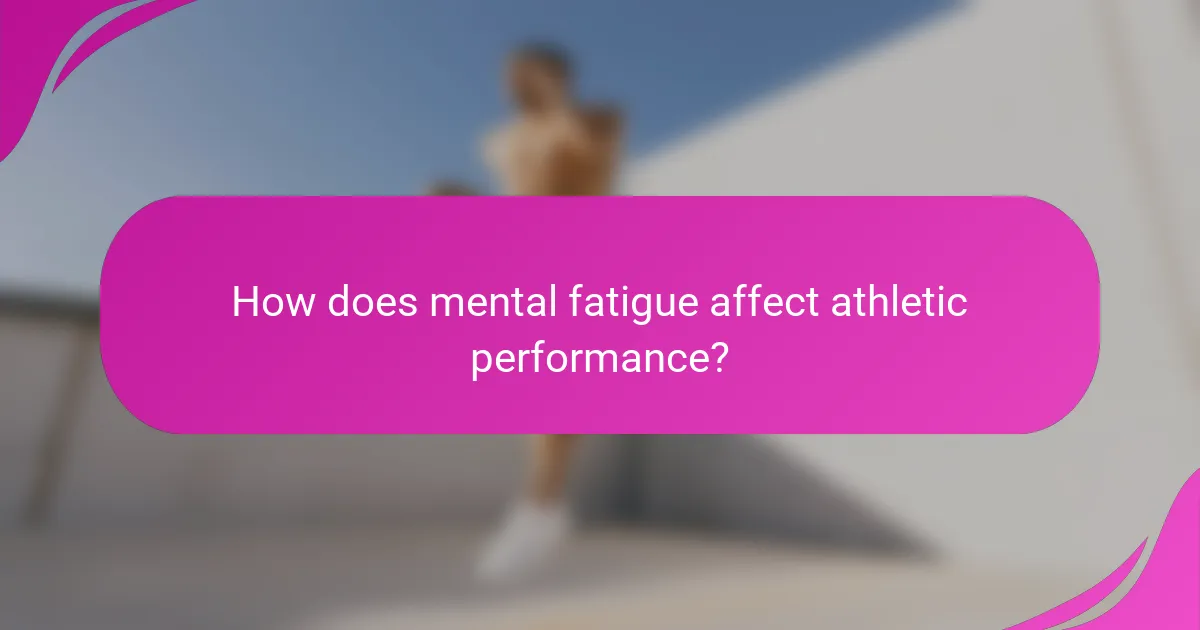
How does mental fatigue affect athletic performance?
Mental fatigue significantly impairs athletic performance by reducing focus and decision-making abilities. Athletes may experience slower reaction times and diminished physical endurance. Strategies to combat mental fatigue include mindfulness practices, adequate rest, and structured recovery routines. These approaches enhance mental clarity and overall performance. Research indicates that mental fatigue can lead to a 20% decrease in performance efficiency, emphasising the need for effective recovery strategies.
What are the signs of mental fatigue in athletes?
Mental fatigue in athletes manifests through decreased motivation, poor concentration, and increased irritability. These signs can significantly impact performance and recovery. Athletes may experience emotional exhaustion, leading to a lack of enthusiasm for training or competition. Cognitive symptoms include difficulty focusing, decision-making challenges, and memory lapses. Physically, fatigue may present as persistent tiredness, disrupted sleep patterns, and a decline in physical performance. Recognising these signs is crucial for implementing effective recovery strategies.
What causes mental fatigue in sports?
Mental fatigue in sports is primarily caused by prolonged cognitive and emotional stress during training and competition. Factors include high expectations, intense focus, and mental overexertion. Athletes often experience burnout, which can diminish performance and recovery. Effective strategies to combat this fatigue involve setting realistic goals, incorporating mindfulness practices, and ensuring adequate rest. These approaches help maintain mental resilience and enhance overall recovery.
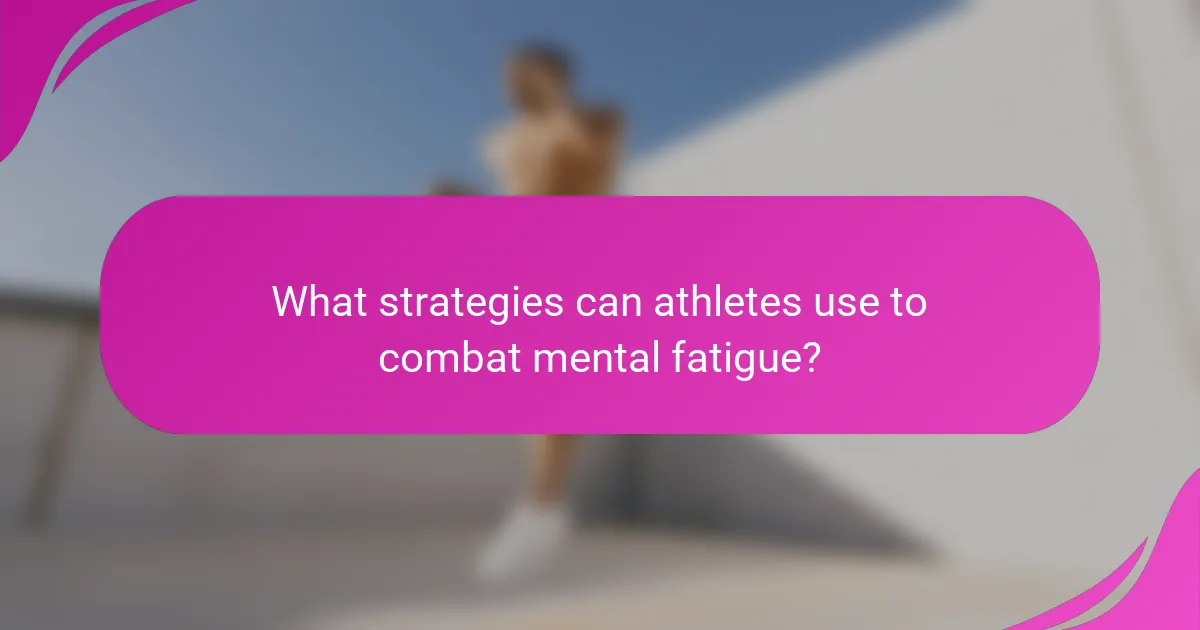
What strategies can athletes use to combat mental fatigue?
Athletes can combat mental fatigue through strategies such as mindfulness, structured rest, and positive self-talk. Mindfulness techniques enhance focus and reduce stress, while structured rest periods allow the mind to recover. Positive self-talk fosters resilience, helping athletes maintain motivation and clarity.
How can mindfulness techniques be integrated into training?
Mindfulness techniques can be effectively integrated into training by incorporating focused breathing, visualization, and body awareness exercises. These methods enhance mental resilience and recovery for athletes. For example, athletes can practice deep breathing during breaks to reduce stress and improve focus. Visualization can be used before performance to mentally rehearse successful outcomes, while body awareness exercises promote relaxation and recovery after intense sessions. Consistent practice of these techniques fosters a positive mindset and combats mental fatigue.
What are effective mindfulness exercises for athletes?
Mindfulness exercises for athletes include focused breathing, body scans, and visualization techniques. These practices reduce mental fatigue and enhance recovery by promoting relaxation and mental clarity.
1. Focused Breathing: Athletes concentrate on their breath to centre their thoughts, which helps alleviate stress.
2. Body Scans: This exercise involves mentally checking in with different body parts, fostering awareness and relaxation.
3. Visualization Techniques: Athletes imagine themselves succeeding in their sport, boosting confidence and performance.
4. Mindful Movement: Integrating mindfulness into physical activity, like yoga, enhances body awareness and reduces tension.
5. Gratitude Journaling: Reflecting on positive experiences fosters a growth mindset and combats negative thoughts.
What role does nutrition play in mental recovery?
Nutrition significantly aids mental recovery by providing essential nutrients that support brain function and emotional well-being. A balanced diet rich in omega-3 fatty acids, antioxidants, and vitamins enhances cognitive performance and reduces stress levels. For example, omega-3s found in fish promote neuronal health, while antioxidants from fruits combat oxidative stress. These nutritional factors contribute to improved mood and resilience against mental fatigue, crucial for athletes recovering from intense physical exertion.
Which foods enhance cognitive function?
Certain foods can significantly enhance cognitive function. Incorporating these into an athlete’s diet may combat mental fatigue and promote recovery.
1. Fatty Fish: Rich in omega-3 fatty acids, which improve brain health and cognitive performance.
2. Blueberries: High in antioxidants, they support memory and delay brain aging.
3. Turmeric: Contains curcumin, which boosts mood and supports cognitive function.
4. Broccoli: Packed with antioxidants and vitamin K, it enhances brain function.
5. Pumpkin Seeds: High in magnesium, iron, zinc, and copper, they support overall brain health.
6. Dark Chocolate: Contains flavonoids that improve memory and cognitive function.
How can sleep hygiene improve recovery?
Adequate sleep hygiene significantly enhances recovery for athletes by promoting restorative sleep. Improved sleep quality leads to better physical and mental health, which is crucial for optimal performance. Studies indicate that consistent sleep routines can reduce fatigue and accelerate muscle repair, ultimately enhancing recovery times. Prioritising sleep hygiene through practices like a regular sleep schedule, a comfortable sleep environment, and limiting screen time before bed can yield substantial benefits for athletes.
What are the best practices for sleep optimization?
To optimize sleep, athletes should prioritize a consistent sleep schedule, create a restful environment, and limit screen time before bed. These practices enhance recovery and combat mental fatigue. Establishing a routine helps regulate the body’s internal clock, while a dark, quiet space promotes deeper sleep. Reducing exposure to blue light from devices can improve sleep quality.
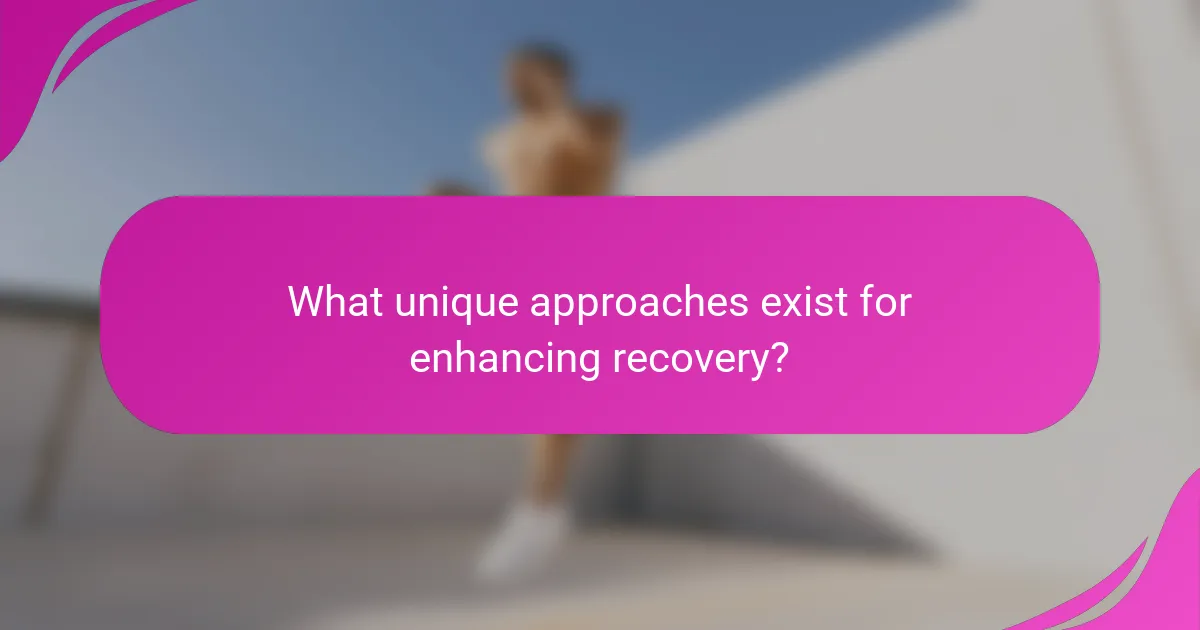
What unique approaches exist for enhancing recovery?
To enhance recovery, athletes can adopt unique approaches that prioritize mental health and emotional resilience. Techniques such as mindfulness practices, creative expression, and building supportive relationships can significantly reduce mental fatigue. Mindfulness helps athletes stay present, fostering a positive mental state. Creative outlets, like art or music, provide emotional release and can rejuvenate the mind. Strong social connections offer emotional support, which is crucial for recovery. These strategies cultivate a holistic recovery process that addresses both physical and mental well-being.
How does emotional support impact mental recovery?
Emotional support significantly enhances mental recovery by providing athletes with motivation and resilience. It fosters a sense of belonging, reducing feelings of isolation. Studies show that athletes with strong emotional support systems experience lower stress levels and faster recovery times. This support can come from coaches, teammates, and family, creating a positive environment that encourages mental well-being.
What is the role of mental coaching in sports?
Mental coaching plays a crucial role in helping athletes manage mental fatigue and enhance recovery. It focuses on strategies that promote emotional resilience, mental clarity, and motivation. Techniques such as visualization, mindfulness, and goal-setting empower athletes to overcome psychological barriers. Research indicates that mental coaching can significantly improve performance by fostering a positive mindset and reducing anxiety. This holistic approach addresses both mental and physical aspects of recovery, ensuring athletes maintain peak performance levels.
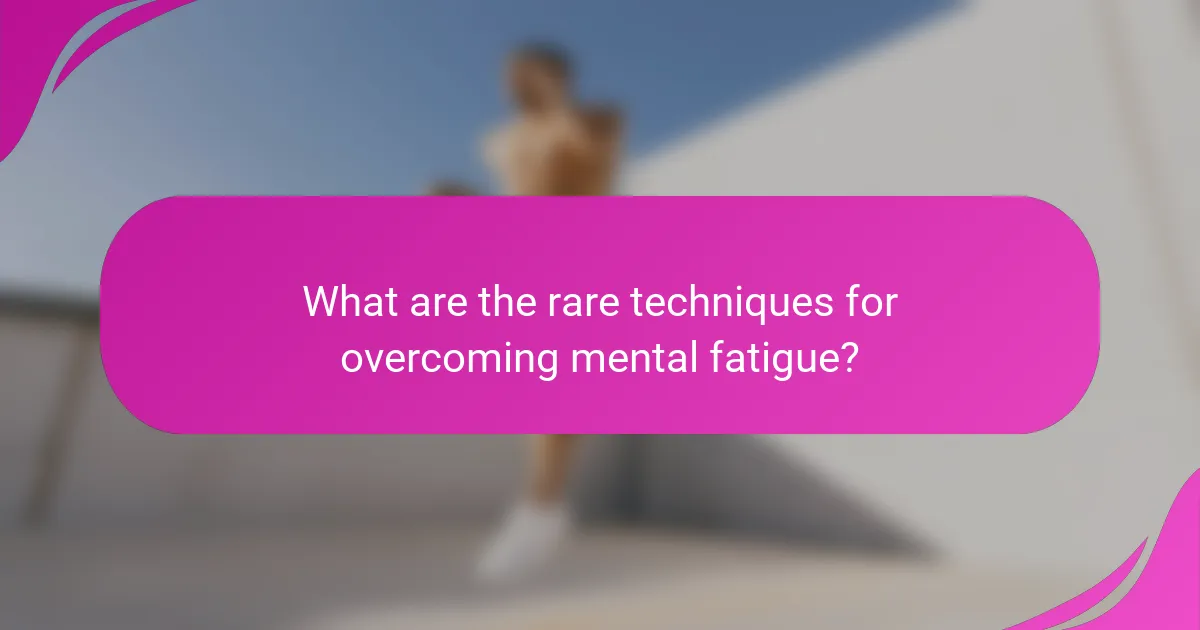
What are the rare techniques for overcoming mental fatigue?
To overcome mental fatigue, athletes can employ rare techniques that focus on emotional resilience and mindfulness. One effective strategy is practicing gratitude journaling, which enhances mental clarity and reduces stress. Another technique involves engaging in creative visualization, allowing athletes to mentally rehearse success and maintain motivation. Incorporating nature therapy, such as spending time outdoors, can significantly improve mood and cognitive function. Lastly, adopting a practice of deep listening, where athletes connect with their emotions and thoughts, fosters a deeper understanding of their mental state and promotes recovery.
How can creative expression aid in recovery?
Creative expression significantly aids in recovery by providing athletes with an emotional outlet. Engaging in activities like art, music, or writing fosters mental clarity, reduces stress, and enhances overall well-being. These practices can lead to improved focus and resilience, essential for combating mental fatigue. Studies show that creative activities stimulate dopamine release, which positively influences mood and motivation. By integrating creative expression into recovery routines, athletes can enhance their mental health and performance.
What unconventional therapies are beneficial?
Love without expectations can enhance recovery for athletes by incorporating unconventional therapies. Practices such as mindfulness meditation, art therapy, and nature immersion have shown significant benefits in reducing mental fatigue. Mindfulness meditation improves focus and emotional regulation, while art therapy fosters creativity and self-expression. Nature immersion reduces stress and enhances mood through exposure to natural environments. These strategies can uniquely address athletes’ psychological needs, promoting holistic recovery.
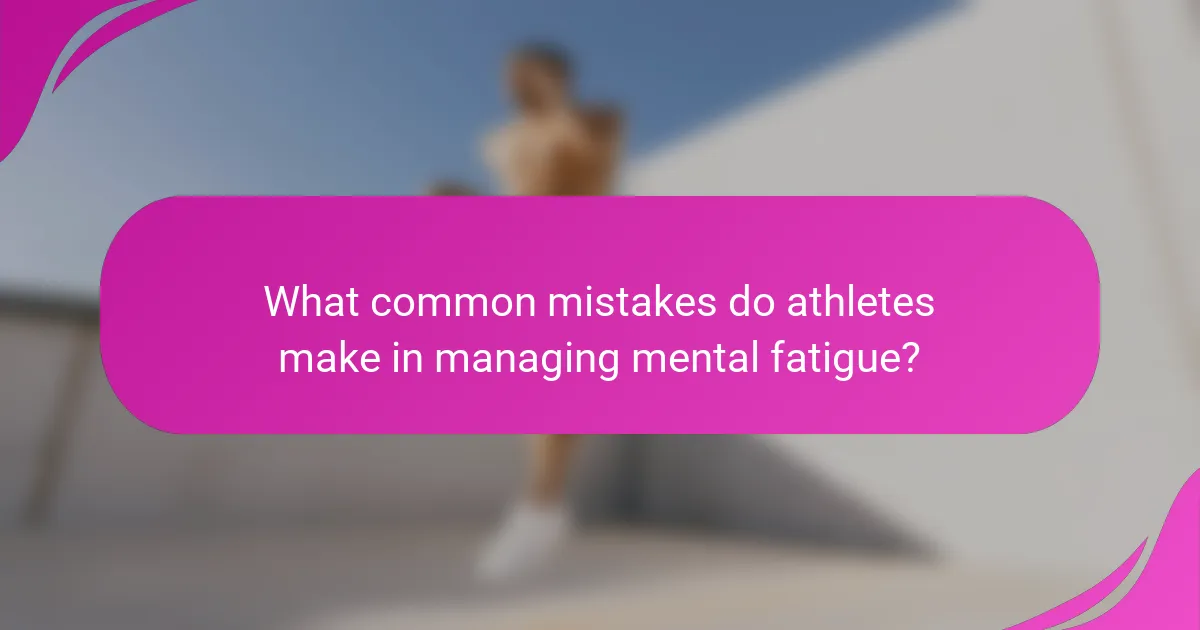
What common mistakes do athletes make in managing mental fatigue?
Athletes often overlook the importance of mental recovery, leading to increased fatigue. Common mistakes include neglecting rest days, failing to practice mindfulness, and ignoring signs of burnout. Additionally, many athletes do not seek support from mental health professionals, which can hinder recovery. Prioritising mental strategies, such as visualization and relaxation techniques, can significantly enhance recovery and performance.
How can athletes avoid burnout?
Athletes can avoid burnout by implementing effective recovery strategies and prioritising mental well-being. Regularly incorporating rest days, practicing mindfulness, and maintaining a balanced training schedule are essential. Engaging in enjoyable activities outside of sport helps rejuvenate motivation. Setting realistic goals and fostering supportive relationships with coaches and teammates further enhances mental resilience.
What are the misconceptions about mental recovery?
Misconceptions about mental recovery often hinder athletes’ progress. Many believe recovery is solely physical, overlooking the mental aspect. Another common myth is that recovery requires complete rest, while active recovery can be more beneficial. Some think mental fatigue is a sign of weakness, not recognising it as a legitimate challenge. Additionally, athletes may underestimate the role of emotional support in recovery, believing they must handle their struggles alone. Lastly, the idea that mental recovery is a quick fix misguides many, as it often requires ongoing effort and strategies.

What are the best practices for sustained mental health in sports?
To sustain mental health in sports, athletes should prioritise self-compassion, establish clear boundaries, and engage in mindfulness practices. These strategies combat mental fatigue and enhance recovery.
Self-compassion allows athletes to acknowledge their struggles without harsh self-criticism, promoting resilience. Setting boundaries between training and personal life prevents burnout, ensuring mental clarity. Mindfulness practices, such as meditation, improve focus and reduce anxiety, fostering a healthier mindset.
Incorporating these strategies leads to improved performance and overall well-being. Athletes who practice self-compassion report higher satisfaction and lower stress levels. Establishing boundaries can enhance recovery time, while mindfulness practices have been linked to improved emotional regulation.
How can athletes create a balanced training regimen?
Athletes can create a balanced training regimen by incorporating mental recovery strategies alongside physical training. Prioritise rest and mindfulness practices to combat mental fatigue. Implement varied training intensities and durations to enhance overall performance. Include recovery techniques such as yoga or meditation to support mental clarity and emotional resilience. Regularly assess and adjust the regimen based on individual needs and stress levels to maintain balance.
What long-term strategies support mental resilience?
Long-term strategies that support mental resilience include fostering a growth mindset, establishing strong social connections, and practicing mindfulness. These strategies enhance athletes’ ability to combat mental fatigue and promote recovery. A growth mindset encourages continuous learning and adaptability, while social connections provide emotional support. Mindfulness practices improve focus and reduce stress, contributing to overall mental well-being.